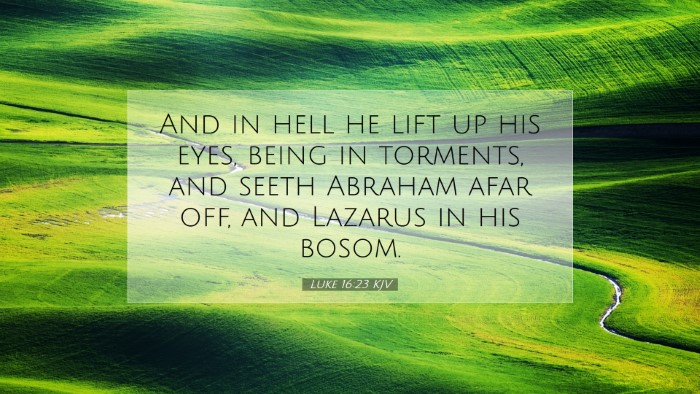Bible Commentary on Luke 16:23
Luke 16:23 states, "And in hell he lift up his eyes, being in torments, and seeth Abraham afar off, and Lazarus in his bosom." This verse is pivotal in understanding the theological implications of the afterlife as presented in the Scriptures. The context in which this verse stands is part of the larger narrative of the Rich Man and Lazarus, where Jesus illustrates the eternal consequences of one's choices in life and their ramifications beyond death.
Overview of Context
This passage occurs during a series of teachings where Jesus focuses on the themes of wealth, justice, and eternal life. The story starkly contrasts the lives of a rich man and a poor beggar, Lazarus, providing a vivid commentary on social disparities and moral responsibilities.
Commentary Insights
-
Matthew Henry's Commentary
Matthew Henry elaborates on the significance of "hell" (Greek: Hades) in the passage. He posits that this story should not merely invoke fear but should serve as a profound warning about the consequences of neglecting the poor and indulging in earthly pleasures. The phrase "being in torments" emphasizes the state of suffering faced by the rich man, reflecting a just recompense for his earthly life devoid of compassion. Henry observes that the man's eyes being lifted signifies awareness and recognition in the afterlife, a consciousness that emphasizes accountability beyond death.
-
Albert Barnes' Notes
Albert Barnes delves deeper into the implications of the rich man's awareness as he observes Lazarus in comfort. He states that this insight into eternal destinies signifies the end of opportunity for repentance and change. This scenario accentuates the stark contrast between the earthly life of the rich and the heavenly reward for the poor. Barnes highlights the idea that the rich man had consciously made decisions during his lifetime that led to his current plight, thereby stressing personal responsibility and the enduring consequences of one's actions.
-
Adam Clarke's Commentary
Adam Clarke brings out additional theological nuances by discussing the location and nature of the afterlife depicted in the verse. He notes that the rich man's intense suffering reflects a principle of divine justice. Clarke suggests that the mention of Abraham indicates the rich man's recognition of what he forfeited – a relationship with the patriarch that could have secured him a place in paradise. Clarke argues that this passage offers rich theological implications about the fate of souls and bolsters the teaching that earthly status does not dictate eternal destiny.
Theological Implications
The implications of this verse extend beyond the immediate narrative. The portrayal of hell as a place of torment serves as a critical reminder of the permanence of one's choices in life as it relates to the afterlife. The conscious experience of the rich man raises questions about the nature of existence post-mortem, highlighting that both punishment and reward are informed by earthly conduct.
Moreover, the sight of Lazarus in the bosom of Abraham introduces the concept of eternal fellowship and comfort for the righteous. This imagery resonates with the Jewish understanding of the afterlife and amplifies the hope associated with faith and alignment with God's will during one's lifetime.
Practical Applications
This verse serves as a sobering reminder for pastors, students, theologians, and scholars alike to cultivate a perspective on wealth that aligns with biblical teaching. It challenges believers to be mindful of the marginalized and to engage in acts of mercy and kindness. The reflective torments of the rich man compel one to consider the weight of spiritual versus temporal wealth.
- Empathy for the Marginalized: Foster a heart that reaches out to those in need, understanding the significance of compassion in the Christian walk.
- Awareness of Eternal Consequences: Recognize that every action has ramifications beyond this life; live in a manner that prepares the soul for eternity.
- Examine Personal Priorities: Reflect on one's relationship with wealth; seek to invest in eternal rather than temporal pursuits.
Conclusion
Luke 16:23 stands as a powerful testament to the realities of the eternal state of humanity, urging readers to grapple with their moral choices. By incorporating insights from respected theologians such as Matthew Henry, Albert Barnes, and Adam Clarke, we glean a multifaceted understanding of scriptural truth—that our earthly lives are intertwined with our eternal destinies, and how we engage with the world around us can significantly alter our standing before God.


